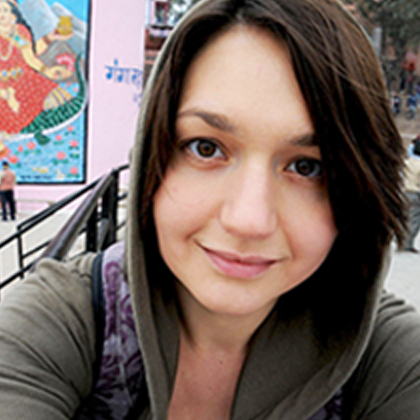- Posted by:
- anjci
- Under:
- About me, Everyday musings
People often ask me how many languages I speak. Not sure what kind of answer they expect, but my usual “none properly” certainly disappoints many. Some even call it false modesty – but it is in fact true.
In my eventful life, I have been known for learning quite a few foreign languages. This does not however mean that I speak any of them. What it merely means is that I have lost every ability to speak any language properly, and instead communicate in a most terrifying blend of all. As goes below.
IN THE BEGINNING
My passion for languages dates a long time back. When anjči was a little girl, primary school children in Latvia could not choose which foreign language to start learning first. Instead, entire classes were assigned one foreign language each, the options being English, French or German. Individual opinions mattered less than a centralised decision. The system was neat and easy to understand.
My class happened to be allocated to German. German being a language extremely important for Latvia thanks to the country’s historical and economic links with Germany, it was probably meant to be a treat. For the reference, you may still find older populations of Latvia speaking German rather than English.
Little did anjči care about history and trade though. A 7-year-old, I knew it was English I wanted to learn. After all, I was planning to move to London when I grew up, and it was not German people were speaking in London. I tried getting transferred to a parallel class but failed. I then made an unsuccessful attempt to attend that parallel class’s English lessons on an exceptional basis. Sadly, our curricula were not always synchronised, and I was risking missing my own, non-language lessons. Nothing seemed to be working, and most people (let alone 7-year-olds) would sigh and give up at this stage.
Not anjči, though. German was so utterly inconsistent with my future plans that, deprived of any reasonable alternatives, I declared a major resistance campaign. What followed was a string of comical episodes involving little anjči being caught engrossed in an English grammar book (strategically positioned on her lap under the desk) in the middle of a German lesson, stubbornly ignoring the teacher’s attempts to get the class to repeat “Hallo, wie geht es dir”. Let’s just say the teacher was not particularly pleased.
The comedy continued until I turned 10, at which stage the original primary school classes were broken up and re-built into new ones. Pupils learning different foreign languages were suddenly mixed together in a class.
Most continued with the language of their original “choice”. Except for anjči – the German teachers had had enough of me, and I was hastily moved to the English group. The days of German were over. My notorious passion for English finally paid off – perhaps helped somewhat by flowers and a bottle of cognac my mother so thoughtfully slipped to my English teacher-to-be.
A LANGUAGE FREAK
Ever since having to fight for my right to learn English, I have had a soft spot for foreign languages. Some might even say I am learning a new language at any given time!
And the scariest thing is that they are probably right: in the last few years, I have made attempts to learn at least seven foreign languages. That’s in addition to Russian, Latvian and English, which I by now consider more or less native. In chronological order, the seven languages are listed below.
P.S. Please note that I will skip Finnish here. I may have lived in Finland for two years, but Finnish was simply stronger than me. As an illustration, the most sophisticated Finnish phrase I ever produced after a year of weekly lessons was “We beat Russia 4-0 in ice hockey, yeah”. I do not even remember the most useful Finnish word (featuring in that particular sentence) anymore. No, it wasn’t “Russia”. I was actually referring to “ice hockey”.
THE SEVEN LANGUAGES
(1) German
Ironically, by the time I was asked to pick a SECOND foreign language to learn at school, I started appreciating Latvia’s “historical and economic links” a lot more and chose German. Even more embarrassingly, German had eventually grown on me so much that I began paying for additional lessons at the Goethe Institut in Riga. I then ended up receiving a Deutsche Akademische Austausch Dienst (DAAD) scholarship and went to Frankfurt to attend a German language school during the summer of 2004. My primary school German teacher started crying when I told her.
In short, I shamelessly love German. It is a wonderful language full of texture, tongue-twisting structures and complex words – being most logical at that. I continue reading “Die Zeit” and sending illiterate German emails to my German-speaking friends sometimes. No-one has ever complained; Deutsch is truly one of my favourite languages.
(2) Irish Gaelic
No joke. I spent one year of high school trying to teach myself a language no other than Irish Gaelic. Not to be confused with Scottish Gaelic, of course. You wonder why? As I once explained in my post on country obsessions, I used to adore Ireland and Celtic music. I had no idea what the songs were about though and was eager to make sense of them – by learning the actual language. Irish Gaelic, ladies and gentlemen.
Needless to say that Latvian bookstores boasted anything but a vast selection of study materials even for conventional languages – let alone the ones with a disappearing population of native speakers. Random online resources were not enough to learn a language extremely difficult, unintuitive and unrelated to other languages I spoke. I persisted for about a year and gave up after failing to translate the “Tá na caoirigh ag ithe an gheamhair” line in one of the songs. It actually meant “The sheep are eating the corn”. Wasn’t it obvious?
(3) Spanish
I was probably the only teenager in my German class who made any effort to learn the language. As a result, I became a personal favourite of Ludmila, our German teacher, who considered me a near language genius. It just so happened that Ludmila was running a foreign language school for English, German and Spanish. As a reward for my heroic German deeds, I was offered a privilege to sneak into Spanish lessons for free. I was such a walking talent for languages, after all!
Spanish was great fun. I attended the lessons for about a year, got to the point of throwing around a few lines from “Farmacia de Guardia” in a perfectly authentic pronunciation and have safely forgotten every word since.
As a side note, I am now desperately trying to revive some of that past knowledge for my upcoming trip to Mexico in October. The fact that I cannot get myself excited about the language is not helpful, though. The only solution I see is to fall in love with some Spaniard, get inspired and call it quits on the day my Spanish hits that longed-for perfection. The position is open, gentlemen!
(4) Swedish
When I finally regained my respect for German, the natural next step was clear. Also a Germanic language, Swedish was related to German and boasted plenty of similar vocabulary – at that being just as historically and commercially important for Latvia.
My first opportunity to learn Swedish arose during the undergraduate school, which offered Swedish as an extracurricular course. The school even shipped myself and a handful of other Swedish enthusiasts to Helsinki (or should I say Helsingfors) for a week-long language immersion. Never mind that native Swedish speakers make up under 10% of the Finnish population – we had a great time. We even learnt the “Sankta Lucia” Christmas song in Swedish. I still perform it in front of my computer at work sometimes.
I returned to Finland a year later, to study for a Master’s degree and to continue Master-ing my Swedish. After two years of trying to convince local Swedish speakers (go find them first) NOT to respond in English to my humble Swedish attempts, I still understand some of the language. Especially after a few drinks.
(5) Greek
The famous Greek! I have written volumes about my experience of living in Greece for eight months. The love affair with the Greek language had started before that though, and in a rather mundane way. At my previous work, I used to sit next to a Greek guy who spent most of his time blabbering on the phone. In Greek, of course. Passing my days (and often nights, too) listening to a language I did not know a single word of was admittedly depressing. In the meantime, I also got hooked on Greek music and began hanging out with some Greeks in London. My fate was cast – from a handful of grammar resources to the ubiquitous “Teach Yourself a Language” book, I began learning Greek.
Greek not necessarily the most popular language among Latvians, it nonetheless quickly grew on me. Like German, it was mouthful and expressive, but did not sound as cheesy as, say, Italian. I still absolutely adore Greek – its speech melody, its peculiar aspirated sounds and the simplicity of its colloquial vocabulary. Never mind that more formal Greek still sounds all, erm, Greek to me.
A fragment of my book shelf. Can you count the Greek books on that picture?
(6) Serbian
As if Greece wasn’t enough, I continued expanding the horizons of my Balkan musical discovery, naturally coming to former Yugoslavia. Those guys really knew how to rock. In the 1980s, ex-Yugoslavia was apparently only second to the UK in the number of rock bands. The music was of outstanding quality, but I could not understand the lyrics. You know the rest.
Serbian was my first attempt at a Slavic language which was NOT Russian. Still, the two are similar enough – which is probably the reason my Serbian was superior to my Greek within only a few months. The “Teach Yourself Serbian” book (possibly one of the better creations of that series) was of great help, too.
I am particularly enchanted by Serbian language’s rough consonants and perfected phoneticity. The added advantage is that it only takes insignificant adjustments to turn Serbian, magically, into Croatian or Bosnian. For the reference, Montenegrin people like to call their language a separate name, too. Personally, I am not convinced.
(7) Norwegian
I have a very special relationship with Norway: if Copenhagen is my perfect city, then Norway is definitely my perfect country. Having met several outstanding representatives of Norway almost a decade ago, I have not spent one year without visiting this incredible country since. And more is to come; indeed, I have planned not one but two visits to Norway over the upcoming weekends. I am also sketching a fortnight-long trip to the Lofoten islands and Nordkapp in the summer of 2011. There is officially not a single country in the world which I have revisited more often than Norway – without ever having lived there.
Norway is the country where English as a foreign language is spoken better than possibly anywhere else in the world. Is there any point in learning Norwegian? Personally, I believe there is. Even if the locals stubbornly force their perfect English onto you and ignore your mildest attempts of practising the local tongue, the travel experience is infinitely better when one understands the language of their destination. Even if it merely amounts to overhearing the locals speak on the train or in shops –understanding the banter of the everyday local life is priceless. Especially when visiting my favourite countries.
The bottom-line is, I am currently learning Norwegian. And no, I am not being overly ambitious to aim at perfect fluency here. If my Norwegian ever hits the level of my Serbian, that will be good enough. Bearing in mind, of course, that my Serbian is meanwhile not standing still, either.
“OG HVA NÅ?”
So far, so bad. My initial strategy of “let’s take my Swedish and make it Norwegian” is failing me mercilessly. Somehow the intermediate knowledge of Swedish is proving to be more of a disadvantage for learning another Scandinavian language. Since I began with Norwegian, my Swedish has deteriorated without recognition – and my Norwegian continues to be impregnated with classic mistakes of a Swedish learner. As a result, I must be quite a laughing stock for the native speakers of both backgrounds. At least it is not Nynorsk I am trying to learn! What on earth is that, anyway?
Finally, the readers will not be surprised to hear that a “Teach Yourself Norwegian” book inevitably appeared in my collection. The book is the masterpiece of the series, and I will be dedicating a fully-fledged blog post to that book alone (you heard me) in the very near future. Stay tuned!











2017 Newsletter | ANJCI ALL OVER says:
December 22, 2017 at 6:52 pm
[…] also brought me plenty of opportunities for personal development. Many of you know about my passion for foreign languages, and, in 2017, I started learning an entirely new language for me – Japanese! Having visited […]
anjci says:
October 29, 2013 at 11:18 am
Hi Pawel,
Here I am returning your comment three months later… nothing like a prompt response : ) thanks very much for this comment. I aim to please! And it is always lovely to meet a fellow language enthusiast. That said, your list is a lot more impressive than mine! So I think you can take over the title.
I have no immediate plans to learn Polish. I am learning Arabic though – obviously thought it would be difficult enough. At least now I can feel not a total fool when I make my grand voyage through another Arab country.
I used to speak and understand about 70 percent of Lithuanian – not based on its (mythical) similarities with Latvian but thanks to many Lithuanian friends. Similarities alone are not enough to have even the simplest conversations, mind you.
Keep on learning then! : )
Anonymous says:
July 27, 2013 at 2:32 pm
Congratulations on your knowledge of foreign languages! Nice to see there are people around the world who share this passion! Latvian similarly to Lithuanian is hilariously difficult, even for me as a native Slavonic language speaker, used to tons of declension forms… 😉 And being able to speak English and Russian at a native level, makes you a trilingual and rare human being… 😉 The Scandinavian languages being added thereto create an image of someone who can literally master any language… 😉 Anyway, as you're brave enough, I'd suggest that you take your turn at learning Polish… 😉 It will twist your tongue for sure!
Good luck and cheers!
Pawel
P.S. I have attempted myself to catch the ten language barrier with Polish, English, French, German, Italian, Spanish, Russian, Czech, Slovakian bu t I have lost on the tenth one – Lithuanian… 😉 Can you speak or understand it based on some similariies to Latvian…? 😉
anjci says:
September 30, 2010 at 9:34 pm
Hvala ti puno na lepim recima, Biberlee : )
Stvarno volim vas jezik!
Biberlee says:
September 23, 2010 at 8:10 am
I'm Bosnian and a language teacher as well, and I am very glad to hear that someone actually took time to try to learn my native language without being obliged or forced to 🙂
Ti si jedna izuzetna žena 🙂
Comments are closed.